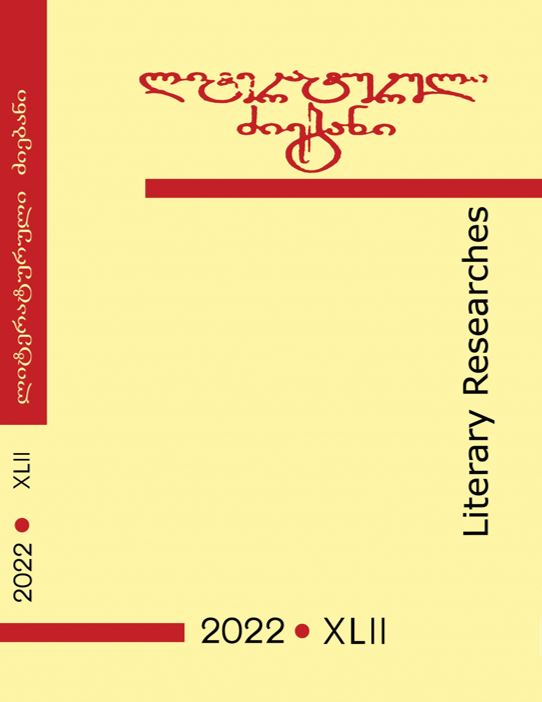Published 2022-04-30
Keywords
- Vers libre,
- P. Iashvili,
- S. Tsirekidze,
- Sh. Apkhaidze,
- Gr. Tsetskhladze
How to Cite
Abstract
This paper considers one important issue of the history and theory of Georgian verse: the genesis of vers libre in national poetry and the history of its study.
On the path of reformation of our national verse of particular importance was a positive impact of symbolism in general and of French symbolists in particular. Georgian conventional verse that was enriched with new metres, fixed verse forms (sonnet, triolet, villanelle, rondel, etc.), also legalized verse libre and thus, the history of Georgian free verse began. Paolo Iashvili’s “To Europe” written in 1915 is considered to be the first example of Georgian vers libre by literary critics of that time (S. Tsirekidze) and contemporary ones (G. Merkviladze, L. Avaliani, L. Bregadze, etc.). Galaktion also introduced free verse in his collection “Artistic Flowers”.
The emergence of the first Georgian specimens of free verse necessitated the creation of the theory of Georgian free verse and the poets did this on their own initiative. In this respect, the “Blue Horns” were especially distinguished.
In the early 20th century, the first letters about vers libre already came out: Sandro Tsirekidze (1920), Shalva Apkhaidze (1922), Grigol Tsetskhladze (1923). In their essays on free verse, these poets analyze the signs of vers libre and consider specific Georgian examples.
Shalva Apkhaidze seems to have been well acquainted with the long essay “Theory of Free Poetry. Notes on Poetic Techniques” written jointly by French poets and critics Charles Vildrac (1882-1971) and Georges Duhamel (1884-1996) in Russian translation. Shalva Apkhaidze took into consideration the views of French authors when explaining and analyzing the first specimens of Georgian vers libre of that time and, we can safely say and took his place in the history of Georgian prosody.
“Theory of Free Verse. Notes on Poetic Technique” written by French authors in the form of essay, in October 2020, was translated into Georgian by Malkhaz Ivanidze (Ivane Amirkhanashvili) and published in three issues of the newspaper Literaturnaya Gruziya (Literary Georgia, N. 21-23).
The material for translation was properly chosen by the translator. Nowadays, when free verse has become a dominant poetic mode in our country but critics of poetic texts are no longer available, it would be useful if their authors familiarize themselves with theory of free verse and the issues of poetic techniques. In any case, at the dawn of the history of free verse, our scholars behaved in this way (Sh. Apkhaidze, S. Tsirekidze, G. Tsetskhladze).
The new translation on the theory and technique of free verse acquires importance and promises the revival of the research process of the issues of the history of Georgian vers libre and theory.
Some issues of Georgian free verse are treated and evaluated in a new way in the letter.

